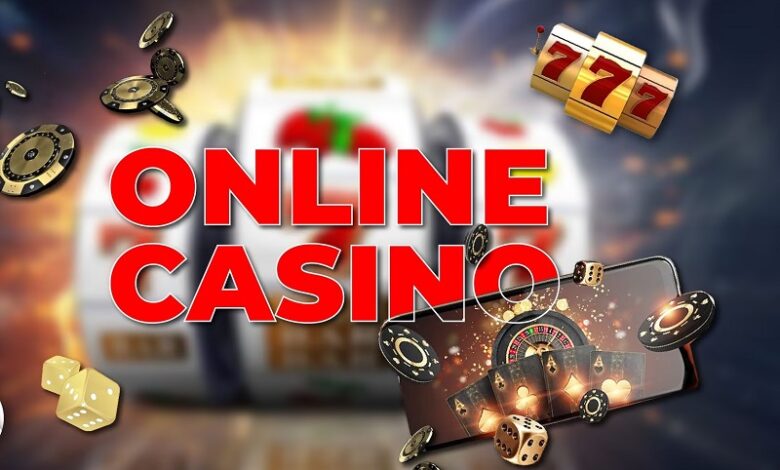Stay Safe: Recognising Phishing Attempts in Online Casinos – Protect Your Identity and Finances

Online casinos offer excitement and potential rewards, but they also attract cybercriminals seeking to exploit unsuspecting players. Phishing attempts have become a prevalent threat in the digital gambling world, putting your personal and financial information at risk.
Phishing scams in online casinos typically involve deceptive emails or messages that appear to be from legitimate gaming sites, aiming to trick you into revealing sensitive data like passwords or credit card numbers. Recognising these fraudulent attempts is crucial for protecting yourself from identity theft and financial loss.
As you navigate the online casino landscape, it’s essential to stay vigilant and informed. By learning to spot the warning signs of phishing and adopting smart security practices, you can enjoy a safer gaming experience and focus on the thrill of the game rather than worrying about cybercrime.
Table of Contents
Stay Safe: Recognising Phishing Attempts in Online Casinos – Protect Your Identity and Finances
Understanding Phishing in the Context of Online Casinos
Defining Phishing and Casino Scams
Prevalence of Phishing Attempts in Gambling Fraud
Common Characteristics of Phishing Emails and Messages
Protecting Personal Information and Financial Assets
Securing Login Credentials and Password Management
The Role of SSL Encryption and Antivirus Software
The Importance of Multi-Factor Authentication
Identifying Red Flags and Suspicious Activities
Malicious Links and Attachments
Bonus Abuse and Gnoming Indicators
Customer Support Interactions and Fraudsters
Community Awareness and Preventative Measures
The Role of Online Gambling Communities
Educational Resources and Reporting Suspicious Behaviour
Implementing VPN Use for Secure Connections
Responding to Phishing and Securing Accounts
Customer Support Response to Phishing Incidents
Managing Chargebacks and Financial Irregularities
Recovering from Identity Theft and Online Fraud
Understanding Phishing in the Context of Online Casinos
Phishing attacks pose a significant threat to online casino users. These deceptive tactics aim to steal sensitive information and financial details from unsuspecting players. When engaging with games like Australian online pokies real money, it’s essential to remain vigilant to prevent falling victim to such scams.
Defining Phishing and Casino Scams
Phishing in online casinos involves fraudulent attempts to obtain personal data by posing as legitimate gambling sites. Cybercriminals create fake websites or send deceptive emails that mimic trusted casino brands.
These scams often request login credentials, credit card details, or other sensitive information. The goal is to gain unauthorised access to your accounts or commit identity theft.
Casino scams may also involve rigged games, non-payment of winnings, or bonus fraud. These tactics can lead to financial losses and compromise your online security.
Prevalence of Phishing Attempts in Gambling Fraud
Phishing attempts are increasingly common in the online gambling industry. Cybercriminals target casino players due to the large sums of money involved and the personal information required for accounts.
Many players fall victim to these scams, often due to a lack of awareness or the sophisticated nature of the attacks. Phishing attempts can occur through various channels, including:
- Fake casino websites
- Deceptive emails or text messages
- Social media impersonation
- Malicious pop-up ads
The rise of mobile gambling has also created new opportunities for fraudsters to target players on their smartphones and tablets.
Common Characteristics of Phishing Emails and Messages
To protect yourself from phishing attempts, it’s crucial to recognise their typical features:
- Urgent or threatening language
- Requests for personal information or login details
- Suspicious links or attachments
- Poor grammar or spelling errors
- Generic greetings instead of personalised ones
- Unusual sender email addresses
Be wary of messages claiming issues with your account or offering too-good-to-be-true bonuses. Legitimate casinos won’t ask for sensitive information via email or text.
Always verify the sender’s identity and contact the casino directly through official channels if you’re unsure about a message’s authenticity.
Protecting Personal Information and Financial Assets
Safeguarding your personal information and financial assets is crucial when engaging with online casinos. Implementing robust security measures can significantly reduce the risk of falling victim to scams or fraud.
Securing Login Credentials and Password Management
Create strong, unique passwords for your online casino accounts. Use a combination of uppercase and lowercase letters, numbers, and symbols. Avoid using easily guessable information like birthdays or pet names. Consider using a reputable password manager to generate and store complex passwords securely.
Never share your login details with anyone, including casino staff. Be wary of unsolicited emails or messages asking for your account information. Legitimate online casinos will never request your password via email or text.
Regularly update your passwords, especially if you suspect any unauthorised access to your account. Enable account notifications to alert you of any login attempts or changes to your personal information.
The Role of SSL Encryption and Antivirus Software
SSL (Secure Sockets Layer) encryption is essential for protecting your data during transmission. Look for the padlock icon in your browser’s address bar and ensure the casino’s URL starts with “https://” before entering any personal or financial information.
SSL encryption scrambles your data, making it unreadable to potential interceptors. This technology is particularly important when making deposits or withdrawals, as it safeguards your financial transactions.
Install reputable antivirus software on your devices and keep it updated. This protective measure helps detect and prevent malware that could compromise your personal information or financial data.
Regularly scan your devices for potential threats and avoid downloading suspicious files or clicking on unknown links, even if they appear to be from the casino.
The Importance of Multi-Factor Authentication
Enable multi-factor authentication (MFA) on your online casino accounts whenever possible. This additional security layer requires you to provide two or more verification factors to access your account.
Common MFA methods include:
- SMS codes sent to your mobile phone
- Authenticator app-generated codes
- Biometric verification (fingerprint or facial recognition)
- Security questions
MFA significantly reduces the risk of unauthorised access, even if your password is compromised. It adds an extra barrier against potential hackers or identity thieves attempting to gain entry to your account.
Be cautious of phishing attempts that try to trick you into revealing your MFA codes. Remember that legitimate online casinos will never ask for your full MFA code through email, phone, or text messages.
Identifying Red Flags and Suspicious Activities
Online casinos can be targets for scammers and fraudsters. Recognising warning signs helps you protect yourself from phishing attempts and other malicious activities.
Malicious Links and Attachments
Be wary of unexpected emails or messages from online casinos. Scammers often use fake promotions or account issues as bait. Hover over links to check the real URL before clicking. Legitimate casino sites use secure domains, usually ending in “.com.au” for Australian casinos.
Avoid downloading attachments, especially executable files (.exe). Genuine casinos rarely send attachments via email. If you’re unsure, contact the casino’s official support channels to verify.
Look out for poor grammar, spelling mistakes, or generic greetings. Reputable casinos maintain professional communication standards.
Bonus Abuse and Gnoming Indicators
Watch for suspicious account activity that could indicate bonus abuse or gnoming. Multiple accounts from the same IP address or device may be a red flag. Casinos monitor for patterns like:
- Identical bet amounts across accounts
- Similar playing styles or game choices
- Coordinated withdrawals
Be cautious of players encouraging you to participate in bonus schemes. Legitimate casinos have strict terms against collusion and multi-accounting.
Customer Support Interactions and Fraudsters
Genuine casino support staff never ask for your password. They may request partial information to verify your identity, but full login details are off-limits.
Beware of unsolicited support messages, especially through social media or personal email. Always initiate contact through official casino channels.
Fraudsters may pose as support to gain your trust. They might offer special bonuses or claim there’s an issue with your account. Verify such claims by logging into your account directly or contacting support through the casino’s website.
Stay alert for pressure tactics. Legitimate support agents won’t rush you to make decisions or transfers.
Community Awareness and Preventative Measures
Protecting yourself from phishing attempts in online casinos requires collective effort and knowledge. By leveraging community resources, staying informed, and implementing security measures, you can significantly reduce your risk of falling victim to cybercrime.
The Role of Online Gambling Communities
Online gambling communities play a crucial role in safeguarding players against phishing attempts. These forums and groups serve as valuable platforms for sharing experiences and alerting others to potential threats. Members often discuss suspicious activities, questionable websites, and emerging scam tactics.
By actively participating in these communities, you gain access to real-time information about new phishing schemes targeting online casino players. Regular engagement allows you to stay updated on the latest security practices and learn from others’ experiences.
Many reputable online casinos host their own community forums. These spaces enable direct communication between players and casino representatives, fostering a sense of trust and transparency.
Educational Resources and Reporting Suspicious Behaviour
Online casinos and gambling regulatory bodies provide educational resources to help players identify and avoid phishing attempts. These materials often include:
- Detailed guides on recognising phishing emails and websites
- Video tutorials demonstrating safe online gambling practices
- Infographics highlighting common red flags in phishing attacks
When you encounter suspicious behaviour or potential phishing attempts, it’s crucial to report them promptly. Most online casinos offer dedicated channels for reporting such incidents, including:
- 24/7 customer support chat
- Specialised email addresses for security concerns
- In-platform reporting tools
By reporting suspicious activities, you not only protect yourself but also contribute to the overall safety of the online gambling community.
Implementing VPN Use for Secure Connections
Using a Virtual Private Network (VPN) adds an extra layer of security when accessing online casinos. VPNs encrypt your internet connection, making it significantly harder for cybercriminals to intercept your data.
When choosing a VPN for online gambling:
- Opt for reputable providers with strict no-logs policies
- Look for VPNs offering strong encryption protocols (e.g., OpenVPN, IKEv2)
- Choose servers in locations where online gambling is legal
Remember to always connect to your VPN before logging into your online casino account. This practice ensures that your personal details and financial information remain protected throughout your gaming session.
Regular VPN use can also help you avoid geo-targeted phishing attempts, as your true location remains hidden from potential attackers.
Responding to Phishing and Securing Accounts
Swift action and proper protocols are crucial when facing phishing attempts in online casinos. Effectively managing the aftermath of such incidents can protect your finances and identity.
Customer Support Response to Phishing Incidents
When you suspect a phishing attempt, contact the casino’s customer support immediately. Provide details of the suspicious activity, including any emails or messages received. Support staff should guide you through security measures, such as changing passwords and enabling two-factor authentication.
Reputable online casinos often have dedicated security teams to investigate phishing reports. They may ask you to forward suspicious emails or provide screenshots of dubious messages. This helps them identify and block fraudulent accounts or websites impersonating their brand.
Customer support should also advise you on updating your security settings and recognising future phishing attempts. They might offer additional resources or direct you to official channels for secure communication.
Managing Chargebacks and Financial Irregularities
If you’ve fallen victim to a phishing scam, check your account for unauthorised transactions. Contact your bank or payment provider immediately to report any suspicious activity. Request a chargeback for fraudulent transactions.
Many online casinos have specific procedures for handling potential fraud cases. They may temporarily freeze your account to prevent further unauthorised access. Provide the casino with any relevant information about the incident to aid their investigation.
Keep detailed records of all communications with your bank and the casino. This documentation can be crucial if disputes arise or if legal action becomes necessary.
Recovering from Identity Theft and Online Fraud
If your personal information has been compromised, act quickly to minimise damage. Contact credit reporting agencies to place a fraud alert on your credit file. This makes it harder for fraudsters to open new accounts in your name.
Change passwords for all your online accounts, especially those sharing similar login details to your compromised casino account. Use unique, strong passwords for each service.
Consider using identity theft protection services. These can monitor your personal information and alert you to potential misuse. Some offer insurance coverage for expenses related to identity theft recovery.
Report the incident to local authorities and relevant online crime reporting centres. Your report can help track patterns of fraud and potentially lead to the arrest of cybercriminals.



